|
|
|
Sort Order |
|
|
|
Items / Page
|
|
|
|
|
|
|
| Srl | Item |
| 1 |
ID:
139628
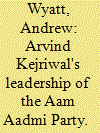

|
|
|
|
|
| Summary/Abstract |
The Aam Aadmi Party (AAP) made its national debut in 2014. Arvind Kejriwal, the National Convenor and a founding leader of the AAP, had a decisive impact on the character of the party. This paper reflects on the significance of Kejriwal's leadership in relation to the literature on party systems and political leadership. In 2014, he attempted to open up a new political cleavage and add a new party to the national party system. His entrepreneurial activity drew attention to the issues of corruption and governance. Kejriwal's political leadership is assessed in terms of his ability to set objectives for the party, his interaction with followers, his efforts to represent those followers and the development of party institutions. Kejriwal's performance as a party leader in 2014 was uneven. The outcome of the Lok Sabha elections exposed the geographical limits of Kejriwal's appeal even as he attempted to provide national leadership.
|
|
|
|
|
|
|
|
|
|
|
|
|
|
|
|
| 2 |
ID:
139625
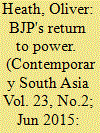

|
|
|
|
|
| Summary/Abstract |
Using constituency-level data, the article examines the BJP's vote swing at the State and Constituency level in India. Drawing on theories of electoral realignment, I examine the BJP's performance at the constituency level and investigate the extent to which the party drew voters from other parties (particularly Congress), mobilised new voters (via increased turnout), and appealed to the newly enfranchised (via increases in the size of the electoral roll). The results of the analysis show that the key to the BJP's success was its ability to mobilise new voters in places where it had previously not fared so well.
|
|
|
|
|
|
|
|
|
|
|
|
|
|
|
|
| 3 |
ID:
139631


|
|
|
|
|
| Summary/Abstract |
The 2014 Lok Sabha election marks a watershed for Indian politics. The elections in the state of Assam have been marked by interethnic violence, fuelled by issues of indigeneity and ‘illegal’ migration. This paper primarily discusses the electoral result from the Kokrajhar constituency in lower Assam, the heart of Bodo politics and a hotbed for ethnic conflict. Two decades of armed struggle resulted in concessions granted to the Bodos, the largest plains tribe in Assam, in the form of a territorial council, under the Sixth Schedule of the Indian constitution. In the 2014 election, for the first time in the history of the constituency, a non-Bodo candidate won, with an impressive 51% of the vote share. The electoral outcome may be seen as a further polarization of the existing ethnic cleavage between Bodos and non-Bodos in the region. Using the theory of outbidding, it will be shown that the victory of a non-Bodo in the constituency may be seen as an outcome of a history of inter-group conflict in the region as well as intra-group rivalry among various factions of the Bodo leadership. Further, this case also illustrates that the propensity of the outbidding effect to foment inter-ethnic violence is greater in contexts where political institutions (in this case autonomous/territorial councils) encourage a singular axis of identity as a basis of mobilization. In conclusion, the paper discusses the implications of this election result for the politics of ‘ethnic homeland’ in Assam.
|
|
|
|
|
|
|
|
|
|
|
|
|
|
|
|
| 4 |
ID:
139624


|
|
|
|
|
| Summary/Abstract |
This special issue examines the patterns, causes and consequences of India's 16th parliamentary elections. The 2014 elections broke records in terms of levels of voter participation, election expenditure and the number of political parties fielding candidates. The outcome marked a break from the past 30 years of India's electoral history with a single party – the Hindu nationalist Bharatiya Janata Party led by Narendra Modi – achieving a parliamentary majority on its own, without depending on coalition partners. Yet not all was new: there were strong continuities amid the change. In this collection, scholars present explanations for the BJP's success, analyse the extent to which urbanisation has acted as a disruptive force for electoral politics, look at the significance of a focus on leaders over political parties in the election campaign, assess the implications of the election result for the Indian party system and examine state-level contests in which regional parties held out against the BJP wave.
|
|
|
|
|
|
|
|
|
|
|
|
|
|
|
|
| 5 |
ID:
139626
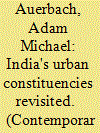

|
|
|
|
|
| Summary/Abstract |
This article examines patterns of voter turnout and electoral competition in India's urban parliamentary constituencies. It places the 2014 Lok Sabha elections in historical context, drawing on constituency-level data from national elections since 1977 to explore broad changes and continuities in electoral competition, party structures, and voter turnout, with particular focus on comparisons between urban and rural India. The purpose of the article is descriptive, seeking to fill a gap in the literature on electoral competition in urban India. I find evidence that India's urban constituencies have recently, on average, been less competitive and participatory than non-urban constituencies, though this has not been a consistent trend since the mid-1970s. This article concludes with a brief outline for a research agenda on electoral politics in urban India.
|
|
|
|
|
|
|
|
|
|
|
|
|
|
|
|
| 6 |
ID:
139627
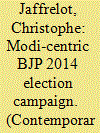

|
|
|
|
|
| Summary/Abstract |
The 2014 election campaign of the BJP was unprecedented not only because, for the first time, a Chief Minister was the prime ministerial candidate of one of the national parties in the fray and tried to promote his state achievements in terms of development across the nation, but also because the party relied on the personality of its leader more than any other party since the Congress under Indira Gandhi. Narendra Modi broke with the BJP's collegial tradition in several ways. He marginalised party veterans, short circuited the BJP apparatus to use a parallel support structure, and resorted to new techniques of communication that saturated the public space. However, these innovations were superimposed on older themes which had sometimes not been used by the BJP itself before, but by others – like caste politics or corruption. Modi's BJP also fell back on some alliances with other parties, the old RSS network, and revisited Hindutva politics to such an extent that ‘development' was definitely not the only theme of the Modi campaign.
|
|
|
|
|
|
|
|
|
|
|
|
|
|
|
|
| 7 |
ID:
139630
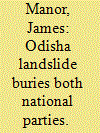

|
|
|
|
|
| Summary/Abstract |
In May 2014, a regional party in Odisha, the Biju Janata Dal, defied national trends by thrashing the Bharatiya Janata Party (BJP) and the Congress Party at both parliamentary and state elections. It offered voters a high-profile regional leader who had radically centralised power and retained the capacity to govern somewhat effectively, even forcefully. It thus countered the appeal of BJP leader Narendra Modi to offer those same things. This analysis examines how this state government – like a few others – was able to withstand the national swing towards the BJP and Modi.
|
|
|
|
|
|
|
|
|
|
|
|
|
|
|
|
| 8 |
ID:
139629
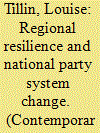

|
|
|
|
|
| Summary/Abstract |
For the first time in 30 years, a single national party has won a majority on its own in the Indian parliament, and does not depend on the support of regional party allies for a parliamentary majority. Yet it is too soon to pronounce the decline or marginalisation of regional parties in India's national political life. The aggregate performance of regional parties remained resilient in the 2014 elections, even marginally improving over 2009. This article considers whether the 2014 elections mark a critical break in the position of regional parties at the national level. The principal argument is that the 2014 elections do not reflect a fundamental alteration in the dynamics of political regionalisation. Rather they suggest a new phase in the impact of regionalisation on the party system at the national level. In a landscape of continually increasing voter choice, electoral outcomes at the national level have begun to narrow to favour a smaller range of parties since 2004. The number of parties able to achieve influence via participation in cabinet governance or coalition has begun to decline. Political fragmentation has not gone away, but its consequences for election outcomes have changed.
|
|
|
|
|
|
|
|
|
|
|
|
|
|
|
|
|
|
|
|
|